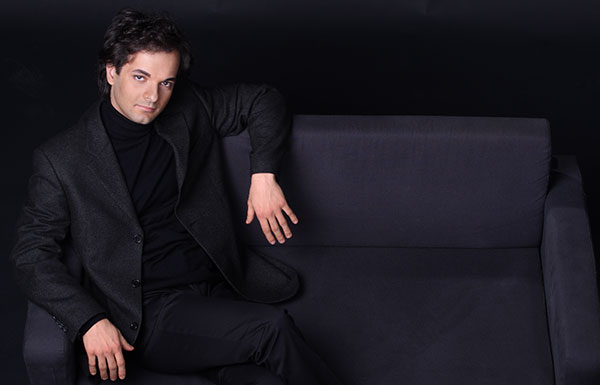Christian Leotta: Romantic warrior
His hair was as windblown as the master’s: long, wild and a maelstrom of tangles.
Italian pianist Christian Leotta held court at the Rustan’s Makati boardroom, talking about performing Beethoven sonatas, the omnipresence of pop music, and crappy films about composers, particularly the bombastic Ludwig himself.
Miloš Forman got it right with Amadeus, according to Leotta. He explained, “Forman is a great moviemaker, whereas Immortal Beloved did not get it at all — the spirit of (the composer), the greatness. It is ridiculous! We don’t have one good Beethoven movie at all.”
But we have an entire corpus of Beethoven facts and even more delicious fiction, the madness, the misery and the music — by Jove! — the music.
Christian Leotta would know.

Leotta’s repertoire features pieces by Bach, Schubert, Rossini and Beethoven. “Do you ever listen to pop music?” a reporter asks Leotta. “Yes, unfortunately,” the master answers, “because it’s everywhere.” He prefers not to listen to music when not performing, because he tends to analyze musical structures immediately. “Structure, harmony, how a piece is built. Music is like a building. It’s important to know what’s there and why it’s there.”
Leotta is a native of Catania, Italy, and now lives in Como. He studied with Mario Patuzzi at Milan’s Conservatory, at the Theo Lieven International Piano Foundation on Lake Como and at the Tureck Bach Research Foundation of Oxford, England. Appearing in Montreal in 2002, at the age of only 22, Christian Leotta is the youngest pianist since the youthful Daniel Barenboim ever to undertake a recital series encompassing the entire corpus of Beethoven’s 32 piano sonatas. Thirteen cycles have been successfully performed, most notably in international music capitals such as Madrid, Mexico City, Montreal, Lima, Vancouver, Venice, Quebec City and Rio de Janeiro, for which the president of the Italian Republic, Carlo Azeglio Ciampi, awarded him in 2004 with the prestigious President’s Medal.
Following the extraordinary success of those live performances of Beethoven, Atma Classique signed Christian Leotta in 2007 to record the entire corpus of the 32 piano sonatas in a collection of five two-CD sets, released between 2008 and 2014. These achievements have earned Leotta accolades such as “one of the major Beethoven soloists of our time” and with mentions of “his prodigious technique used to better express the poetry of Beethoven’s music.”
Leotta was asked what goes on in his mind when he plays the master’s sonatas.
“When you read a poem, you don’t need to imagine anything. It’s there,” he answered. “This is the beauty of Beethoven’s music; it doesn’t describe anything. It is pure music. Actually, music describes what your mind is able to reach.”
He added that when you play a sonata, it is “a mirror of you.” The man recalled one of the first lessons taught him by the great Karl Ulrich Schnabel who said, “Do you want to be a great composer? Remember, we are interpreters, we have to do what is written in the score, it’s all there… Beethoven knew what he wanted.”
How does one reach the level of performance where there is an almost a telepathic connection between a long-dead composer and a now-living interpreter?
Leotta smiled and said, “First rule is to practice, the second rule is to practice, and the third rule is to practice.”
It was Karl Ulrich Schnabel who first suggested to Leotta that he learn all of Beethoven’s sonatas, which Karl Ulrich’s grandfather — the great Arthur Schnabel — recorded for the first time in the history of music. (Consider this direct line of classical coolness: Arthur Schnabel was the best student of Theodor Leschetizky, who in turn was the best student of Carl Czerny, who in turn was the best student of Beethoven himself.)
“Thus,” said Leotta, “my teacher shared with me the tremendous tradition and knowledge coming directly from Beethoven.”
The next day, sitting inside the Tanghalang Aurelio Tolentino (Little Theater) of the Cultural Center of the Philippines (CCP), we got to see Christian Leotta coax the ghost of Beethoven inside the venue via the allegros and andantes of the master’s Appassionata.
The Italian pianist also played pieces by Bach, Schubert and Rossini, but it was his deft (no pun intended) performance of Piano Sonata No. 23 in F minor Op. 57 that got most audience-members riveted: airy, light and romantic at times (the start of the second movement), persistent, bold and with sweeping cadenzas (the start of the third movement). I never realized a grand piano had so many tones (and I meant “tones” and not just “notes…”) — from the softest pianissimo to the loudest fortissimo. Sad, light, foreboding, whimsical, brash, menacing, idyllic, wistful… different moods at the hands of Leotta. Ah, a sorcery of hands and Steinways.
I could just imagine how the Appassionata’s climax coaxed listeners at CCP into getting an appointment of sorts with all the demons, dreamers and muses that communed with Ludwig whose music swirls in outer space as delivered by those Voyager probes.
Or the sonata simply led listeners into a foraging into — well, as Christian Leotta eloquently puts it — what’s in their own headspace.
* * *
Billed as “An Evening With Christian Leotta: From Bach to the Romantic Piano of Schubert, Rossini and Beethoven,” the event was presented by the Embassy of Italy in Manila, the Philippine-Italian Association (PIA) and the Cultural Center of the Philippines (CCP) in cooperation with Furnitalia and with the support of Trevi Foundations Phils. Inc., Sta. Elena Golf & Country Estate, SSI Group Inc., Diamond Hotel, Shopwise, Global Executive Solutions Group and Lombardi’s Authentic Italian Restaurant. The concert was for the benefit of the Philippine Italian Association Endowment Fund.



















